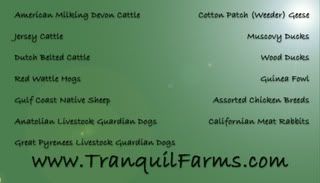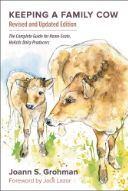Post by catherine on Dec 6, 2010 20:44:40 GMT -5
I posted our 6 month old meat pigs in the Auction Barn, and ended up spawning a fascinating discussion on Boar Taint. I think that it's a question that we've all wondered about, and I think that everyone's input will be valuable. Therefore I'm copying my last post on that thread here to begin the conversation. I do hope that everyone that has experience with intact boars will contribute their 2 cents. Thanks!
"Hey Guys!
Life has been busy and our PC has been on the fritz. Sorry that this is the first that I've been able to get on line.
About your Boar Taint question, Janene..I'm so very glad you asked. I understand that people are concerned about risking their meat supply, so we are testing our line of RWs for taint ourselves, and have experienced no problems at all, so far.
First off, we read Walter Jeffries' blogs on the topic, and felt that he made a good case for the dangers of castration (possible infection and/or intestinal prolapse, plus slowed growth rate due to stress for the piglet) and distress for the castrator/s. He also made good cases for certain (older, heritage) strains being taint free, as opposed to more modern pigs and/or modern management practices resulting in taint. It kind of reminds me of the A2 question in modern vs. heritage type cattle breeds. He also argues for raising boars on pasture with lots of fiber in their diet to help further reduce any taint possiblities (not having boars penned tightly so they don't live on their own scat). He specifically does NOT separate his boars from their ladies though, and he's butchered hundreds of intact boars up to 30 months of age with no problems whatsoever. You might want to read what he himself has to say in his blog on the topic of Boar Taint....http://flashweb.com/blog/2009/04/tainted-big-pharma.html. It's very, very interesting.
Second, Leslie, I agree with you about strong smelling boars. I know that I can't smell the difference between our boys and girls.
As for our own personal experimentation, we've now butchered out one 6 month old intact boar with the sweetest meat ever. Our first boar to butcher was an 11 month old intact boar with delicious meat. We've recently butchered two more intact boars, at 16 months of age, that are ever so scrumptious. One butcher thought he detected a hint of taint in the hide (which had lain on the ground in urine, etc.) of one of those two big boys, but the ones who were doing the actual cutting (and roasting of a slice) found NO taint in the meat. We've since eaten the rest of the head meat, numerous chops and roasts from both boars and found the meat to be spectacular. We have a few more of those big guys still growing out there in the pasture, and we plan on continuing our experiment, perhaps even up to Walter Jeffries' 30 months of age, to see if we encounter a problem at some point. I figure that if we do actually encounter taint at some point, we have lots of big Great Pyrs. who won't mind the meat one little bit! So, we'll continue to butcher out the remaining big boys we have for our own meat supply, testing our line of RWs for taint.
That said, I think most people are going to want to butcher their pigs out at the more standard 5-6 months/250 lb. range. At that age, our guys aren't really showing much of an interest in girls yet, they are reaching their feed conversion max, still fit in our butcher's scalding tank, and are ever so delicious. At least in our strain of RWs, with our management practices, I have no concerns whatsoever about boar taint at any age under a year, and very, very little concern over that age. The 3 Missouri farms we got our breeder pigs from have always eaten their retiring old boars, so I'd say that's quite a good track record of the eating quality of RWs, at least for this particular strain and this particular breed. However, along with Walter Jeffries, I'm beginning to suspect that most pigs raised on pasture will test out similarly.
I think that the more we share information on our RWs and/or our various breeds and our management practices, the more we'll all know. So I encourage everyone with RWs, or any breed of pigs, to chime in to this discussion...in fact, I think I'll copy this note and make it a special thread over in the Pig Section. Let's keep reporting what we all find, the good, the bad and the tasty, so that all of us can benefit. "
Read more: familycow.proboards.com/index.cgi?action=display&board=forsale&thread=37667&page=1#ixzz17NzlAcZN
"Hey Guys!
Life has been busy and our PC has been on the fritz. Sorry that this is the first that I've been able to get on line.
About your Boar Taint question, Janene..I'm so very glad you asked. I understand that people are concerned about risking their meat supply, so we are testing our line of RWs for taint ourselves, and have experienced no problems at all, so far.
First off, we read Walter Jeffries' blogs on the topic, and felt that he made a good case for the dangers of castration (possible infection and/or intestinal prolapse, plus slowed growth rate due to stress for the piglet) and distress for the castrator/s. He also made good cases for certain (older, heritage) strains being taint free, as opposed to more modern pigs and/or modern management practices resulting in taint. It kind of reminds me of the A2 question in modern vs. heritage type cattle breeds. He also argues for raising boars on pasture with lots of fiber in their diet to help further reduce any taint possiblities (not having boars penned tightly so they don't live on their own scat). He specifically does NOT separate his boars from their ladies though, and he's butchered hundreds of intact boars up to 30 months of age with no problems whatsoever. You might want to read what he himself has to say in his blog on the topic of Boar Taint....http://flashweb.com/blog/2009/04/tainted-big-pharma.html. It's very, very interesting.
Second, Leslie, I agree with you about strong smelling boars. I know that I can't smell the difference between our boys and girls.
As for our own personal experimentation, we've now butchered out one 6 month old intact boar with the sweetest meat ever. Our first boar to butcher was an 11 month old intact boar with delicious meat. We've recently butchered two more intact boars, at 16 months of age, that are ever so scrumptious. One butcher thought he detected a hint of taint in the hide (which had lain on the ground in urine, etc.) of one of those two big boys, but the ones who were doing the actual cutting (and roasting of a slice) found NO taint in the meat. We've since eaten the rest of the head meat, numerous chops and roasts from both boars and found the meat to be spectacular. We have a few more of those big guys still growing out there in the pasture, and we plan on continuing our experiment, perhaps even up to Walter Jeffries' 30 months of age, to see if we encounter a problem at some point. I figure that if we do actually encounter taint at some point, we have lots of big Great Pyrs. who won't mind the meat one little bit! So, we'll continue to butcher out the remaining big boys we have for our own meat supply, testing our line of RWs for taint.
That said, I think most people are going to want to butcher their pigs out at the more standard 5-6 months/250 lb. range. At that age, our guys aren't really showing much of an interest in girls yet, they are reaching their feed conversion max, still fit in our butcher's scalding tank, and are ever so delicious. At least in our strain of RWs, with our management practices, I have no concerns whatsoever about boar taint at any age under a year, and very, very little concern over that age. The 3 Missouri farms we got our breeder pigs from have always eaten their retiring old boars, so I'd say that's quite a good track record of the eating quality of RWs, at least for this particular strain and this particular breed. However, along with Walter Jeffries, I'm beginning to suspect that most pigs raised on pasture will test out similarly.
I think that the more we share information on our RWs and/or our various breeds and our management practices, the more we'll all know. So I encourage everyone with RWs, or any breed of pigs, to chime in to this discussion...in fact, I think I'll copy this note and make it a special thread over in the Pig Section. Let's keep reporting what we all find, the good, the bad and the tasty, so that all of us can benefit. "
Read more: familycow.proboards.com/index.cgi?action=display&board=forsale&thread=37667&page=1#ixzz17NzlAcZN







 If you had two pigs to choose to breed from and one had taint (biopsy or offspring slaughter tests) then breed the one without taint in the future. Anyone can also work at breeding away by breeding the pigs that show the least taint.
If you had two pigs to choose to breed from and one had taint (biopsy or offspring slaughter tests) then breed the one without taint in the future. Anyone can also work at breeding away by breeding the pigs that show the least taint.
